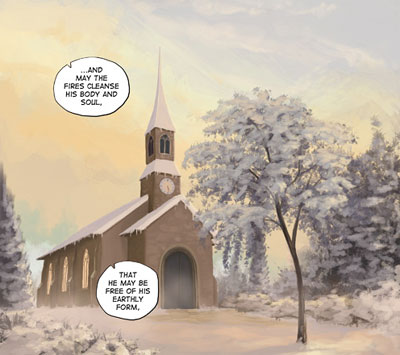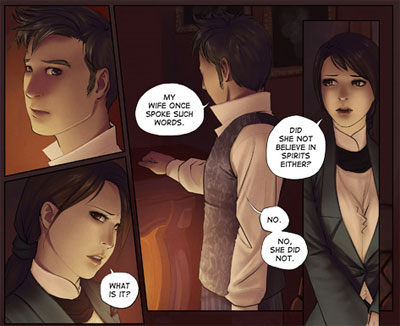The Phoenix Requiem is Sarah Ellerton's second webcomic. Her first webcomic Inverloch was completed in 2007 and later published in print by Seven Seas. She describes The Phoenix Requiem as "a Victorian-inspired supernatural fantasy story about faith, love, death, and the things we believe in."
I got a chance to catch up with her via email this month.
Can you tell us a little about yourself?
I'm a 20-something geek; I like videogames, code, and playing around with computers. I've had one for as long as I can remember, using them to draw pictures since the days of 16 colours. I've dabbled a bit in 3D, though I'm no expert. For extra hobbies I've tried everything from juggling to kendo.
What's a typical day for you like recently?
Get up, go to work all day, go home, then work on the comic until about midnight. Producing five full-colour pages a week takes a lot of
time (30 hours on average), so it means putting in some long hours.
Where are you located these days?
I live on the north-east coast of Australia, in a tiny rural town. Broadband internet is still a novelty and only half of the digital
television channels get through. So… pretty remote!
Do you have another job besides working on comics?
I work full-time for a university as a systems engineer, which mostly involves administration of Solaris (unix) servers, networked storage, email infrastructure, and web applications. I find that I get the most enjoyment out of my work and hobbies by keeping them completely different from each other.
Do you read other comics? What are you reading online or in print?
I read a lot of comics online, but none in print. My current favourite online ones are Fey Winds, Xylia, and Lackadaisy Cats.
Give me the 30 second "convention pitch" for your comic.
The Phoenix Requiem is a Victorian-inspired veneer fantasy. It's about a man who must look to his past and his faith in order to discover what is wrong with him and why he is frequently haunted by all manner of supernatural creatures. It's part horror, part drama, and part love story, with something of a preoccupation with madness and death.
 How has the strip evolved over time?
How has the strip evolved over time?
There's a huge improvement in the artwork – I went from cartoonish cel-shading to a soft painted style, and I'm always trying to put more realism into the way the characters look and express their thoughts. The story itself is based on a script I've already written, so that aspect can't really 'evolve' per se.
Do you have a favorite strip or storyline from the comic? Which ones do fans seem to bring up the most?
My comic is more of a graphic novel than an endless comic (or a set of stand-alone gag strips) so there are no multiple 'storylines' or
'strips' – the entire thing is a single entity like a movie or a book, and it's the whole that's important. That being said, there are scenes
and moments that the fans have particularly enjoyed – the most popular so far involved a certain character confessing to a less than savoury past of working as a prostitute.
Are there any of your characters you're really fond of? Any that are particularly difficult to use?
I'm fond of all my characters – beautiful or ugly, kind or cruel. They're all fun to work with in their own way. I often find the less attractive ones are the most fun to draw, because they have interesting features. They all have quite different personalities as well, and developing each one and revealing their traits and histories is always enjoyable.
Do you have any long term goals or ambition for the future of the comic?
To finish it! The story will be about 800 pages long, which will take at least two more years to complete. After that, I imagine I'll
probably craft a new story, learning from my mistakes and criticisms to hopefully create something better and increase my success and draw in more readers. Creating comics is a lot of fun and I hope to never tire of it.
Any plans for a print collection?
Absolutely. The story divides up neatly into five volumes of about 160 pages. I haven't actually taken any proactive measures about finding a publisher, but I plan to do that once I have finished re-shading my earlier pages to do away with the cel-style shading and keep a consistent look from start to finish.
How do you go about promoting your work? What seems to be most effective at pulling in new readers?
Every now and again I do a burst of advertising across other webcomics and comic listings, which usually works rather well. I also try to make sure my comic is listed in major comics directories, toplists, etc.
Any collectives you're working with? If so can you tell us about what kinds of things does the collective do and how does it benefit everyone in it?
I'm a founding member of Tomgeeks, which is a collective for female comic creators. They list comics created or co-created by women, have an active forum, review comics, and generally promote the work of females in this male-dominated area.
What conventions are your favorites to exhibit at? What advice do you have for others just starting to show their work at conventions?
I've never attended a convention due to the remote area in which I live; I would love to go to one in future, however.
When you create a comic, how do you appproach it? Do you start with the words and then think about the scene that should go with it or do you start with more of purely visual approach or none of the above?
I wrote the entire script for the story before I began drawing. This means it's only a matter of deciding how much of the script to put on
each page, figuring out the camera angles, layout, and direction. I suppose it feels a little bit like directing a movie – the dialog and
characters are already there, you just need to figure out where they should stand, how they should move, and where the camera should be.
 What tools do you use to make comics? Can you give us a brief walkthrough of your process?
What tools do you use to make comics? Can you give us a brief walkthrough of your process?
I use a combination of Painter and Photoshop. I do my rough sketches and basic frame & speech bubble layout in Photoshop, then switch to Painter for lineart. Painter seems to produce much crisper lines and has canvas rotation tools to aid in drawing characters accurately no matter how they are positioned within the frame. I return to Photoshop for colours, shading, and backgrounds. I've used the program for many many years so it feels more comfortable and familiar to work in for the colour stages.
Did you do your own website? What software are you using on it?
The website is pretty simple; hand-coded mostly in HTML/CSS with a little bit of PHP for the comic viewing page. It's a breeze to update and can be easily overhauled when I feel like changing the design. There were a few pre-made comic scripts / programs around, but they were all far too complex for what I wanted, so I ended up coding my own.
How would you describe your relationship with your fans? Do you engage in a lot of online interaction with your readers?
I have a large forum where fans can discuss the newest pages, as well as post their own art, stories, engage in role-playing, other forum games, or just talk about things in general. I actively participate, and it's a lot of fun. I've met many wonderful people through this
community, and overall, being able to have instant feedback from others has been of real benefit to my work. They think of things that I often don't, spot mistakes, and give suggestions.
Did you read comics as a kid? Which ones? What are your influences from comics today?
As a kid I read a few Disney comics – Donald Duck, Scrooge, and Mickey Mouse among others, though I'm not sure they've really had much influence on my own creations today. I read little bit of novel-style manga in recent years, which is probably what mostly inspired the stand-alone story format I'm working with (rather than something long-running with multiple fast-paced story arcs).
Other non-comic influences on your art and/or writing?
I think movies have always been my largest influence. I like self-contained stories with a beginning, a middle and an end – I often
lose patience with tv shows because they keep going indefinitely. Disney has always been a big influence on my art – I just love their
lush backgrounds and strive to capture a similar look in what I do.
What is it about comics that leads you to pour your creative impulses into that form as opposed to writing or some other art form?
I suppose I see myself as an artist first and a storyteller second. Paintings alone can't tell the kinds of stories I'm interested in
telling, and I'm not terribly skilled with creative writing. Comics allow me to tell stories through art without having to figure out how
to describe the scenery and actions in an engaging way.
Recent Comments